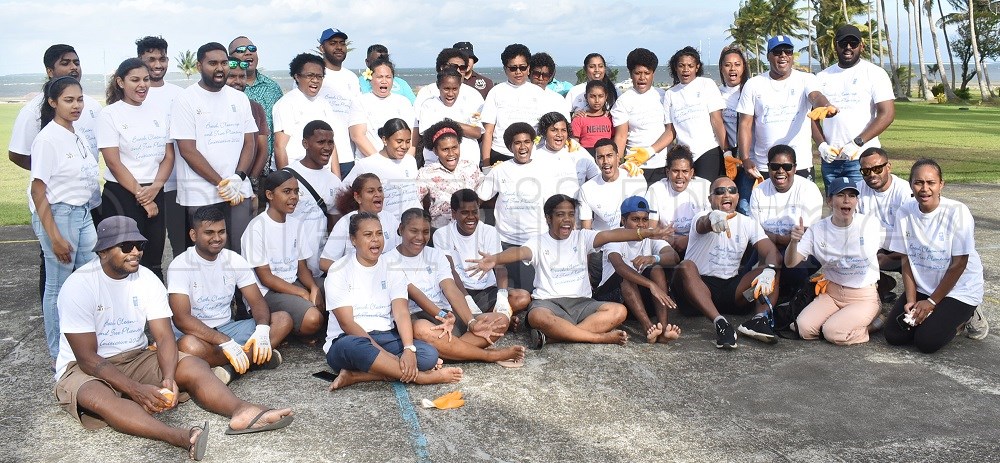The plastic crisis that Fiji and the Pacific face is real and to help curb it, everyone no matter how big or small must do their part to take care of the environment.
Through the United National Development Programme (UNDP), a beach clean-up and tree planting initiative was conducted by 80 participants from six different organisations at Nasese and Sacred Heart College in Suva last week.
The objective of the clean-up and tree planting initiative was to encourage societies, particularly younger generation to be actively involved in curbing the plastic crisis that the country and the broader Pacific region face.
UNDP Accelerator Lab for the Pacific, community research and ethnographic solutions mapping head, Dr Mohseen Riaz-Ud-Dean said if people carried on with ‘business as usual’ there would be more plastic than fish in the oceans.
“As people of the Pacific who rely on the marine environment for our livelihoods, we cannot let plastics take a toll on our livelihoods,” he said.
“We all have a responsibility to help solve this plastic menace.”
He said it was great to partner with the South Pacific Tourism Organization (SPTO), the Ministry of Forestry, the Ministry of Commerce, Trade, Tourism and Transport, members of the Pacific Ocean Litter Youth Project (POLYP) and students from Sacred Heart College in the beach clean-up and tree planting initiative.
“We started to plan this initiative as a follow up from our Plastics Circularity and Systematic Design Workshop which we conducted with various stakeholders in June this year at the Pearl Resort,” he said.
“In fact, addressing the plastic crisis has always been high on both the UNDP Accelerator Lab Pacific and the South Pacific Tourism Organization’s agendas.
“The Ministry of Forestry, Ministry of Commerce, Trade, Tourism and Transport, members of POLYP and Sacred Heart College were eager to join the initiative because they all wanted to do their part. Also they believed in the message that we were trying to get across to the public.”
He said the group had collected plastic bottles, plastic bags — predominantly those for single use, food packaging, different types of plastic containers, discarded fishing gear and plastic construction netting whilst other plastic made items were also gathered.
“This re-asserts that we still have a long way to go and there needs to be a strong focus in changing mindset and behaviour especially when it comes to plastic use and disposal and as we all know behaviour is really one of the hardest things to change,” he said.
“We are leveraging on the young generations as agents of change and using the power of social media to create awareness.
“Other ways exist to influence behaviour change such as incentives and targeted policies that address plastic use and disposal.”
The types of trees planted during the tree planting exercise were local fruit trees like kavika and guava, sandalwood and mahogany. A lot of participants turned up for the beach clean-up and tree planting initiative.
“There was a great turn out with even more people expressing their interest to join future initiative so we do anticipate more of these activities,” said Dr Mohseen Riaz-Ud- Dean.
“We are challenging other organisations, groups and businesses to organise similar activities. It will be great to get a movement going because we all have a responsibility towards putting an end to the plastics crisis facing the globe.”
According to global statistics, approximately eight to 10 million tonnes of plastic debris enter the ocean each year.
The problem has been attributed to unsustainable human behaviour including poor disposal methods, weak law enforcement and legislation, ineffective waste management systems and unknown leakage sources, among others.
In 2019 a study conducted under the three-year “Pacific Waste Free Islands” project in Fiji, found that around 19,667 tonnes of plastic material were imported into the country and from these 4880 tonnes were leaked into the environment.
The data revealed that around 40 per cent of the leaked plastic waster came from the household sector, equivalent to around 1939 tonnes of plastic waste and 45 per cent came from commercial businesses.
The fishery sector leaked around 2.9 tonnes of consumable plastics and about 19.9 tonnes of fishing gear. In the tourism sector, tourists generated seven times more plastic waste per person a day than a Fijian resident and 13 per cent of tourism waste was plastic.



